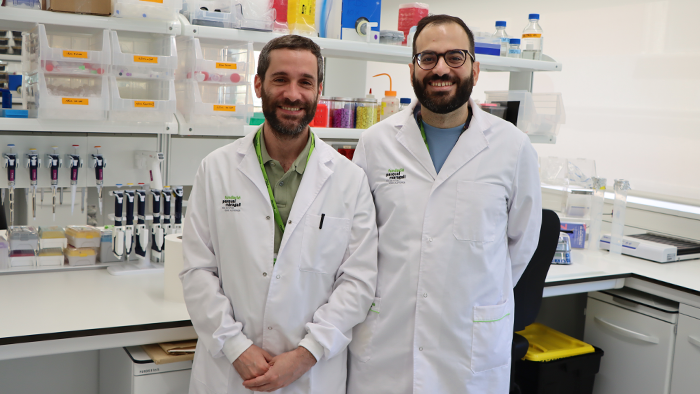26 May | 2025
New blood biomarker panel accurately detects early Alzheimer’s risk

Dr. Marc Suárez-Calvet and Armand González-Escalante
A new study led by researchers at the Barcelonaβeta Brain Research Center (BBRC), recently published in eBioMedicine, highlights the potential of a blood-based biomarker panel to detect early signs of Alzheimer’s disease in middle-aged individuals with no evident cognitive symptoms.
The research, led by Armand González-Escalante, PhD student and Dr. Marc Suárez-Calvet, group leader of the Fluid Biomarkers and Translational Neurology Research Group, focused on a panel of plasma proteins capable of identifying early amyloid-β (Aβ) accumulation—one of the first changes in the brain linked to Alzheimer’s disease, starting well before the onset of cognitive symptoms.
Among the biomarkers studied, the ratio between the plasma proteins p-tau217 and Aβ42 stood out as the best performing biomarker in detecting individuals with amyloid accumulation. This biomarker correlated well with the current golden standards, cerebrospinal fluid (CSF) measurements and positron emission tomography (PET) scans and achieved a discrimination performance (AUC) as high as 0.94.
“The study uses a fully automated plasma panel, which will help its translation into clinical practice. Also, some of the biomarkers are not affected by common confounders such as renal function, which make them promising candidates for future implementation”, explains Armand González-Escalante.
The study was conducted within the framework of the ALFA+ longitudinal cohort, part of the ALFA study (ALzheimer's and FAmilies) at the BBRC, supported by the ”la Caixa” Foundation, which follows 400 cognitively unimpaired participants at risk for Alzheimer’s disease.
The findings show that changes in this biomarker ratio not only reflect current levels of Aβ pathology but also track its progression over time. This fully-automated blood test could become a scalable, minimally invasive tool to detect and monitor Alzheimer’s-related changes long before symptoms appear—though researchers stress the need for further studies in broader populations and with longer follow-up periods.
“Our study demonstrates that specific blood biomarkers can accurately detect amyloid pathology even in individuals without symptoms, marking a significant step forward for early detection of Alzheimer’s disease”, adds Dr. Marc Suárez-Calvet.
These promising results reinforce the BBRC’s commitment to advancing early detection strategies in the fight against Alzheimer’s disease.
Reference article: González-Escalante A, Milà-Alomà M, Brum WS, Ashton NJ, Ortiz-Romero P, Shekari M, Campo MD, Anastasi F, Quijano-Rubio C, Kollmorgen G, Minguillón C, Sánchez-Benavides G, Grau-Rivera O, Gispert JD, Zetterberg H, Vilor-Tejedor N, Blennow K, Suárez-Calvet M. A plasma biomarker panel for detecting early amyloid-β accumulation and its changes in middle-aged cognitively unimpaired individuals at risk for Alzheimer's disease. EBioMedicine. 2025 May 24;116:105741. doi: 10.1016/j.ebiom.2025.105741. Epub ahead of print. PMID: 40414160.









